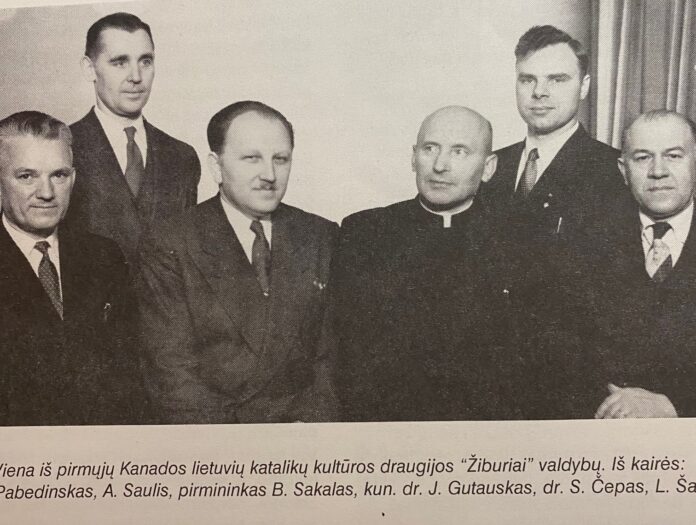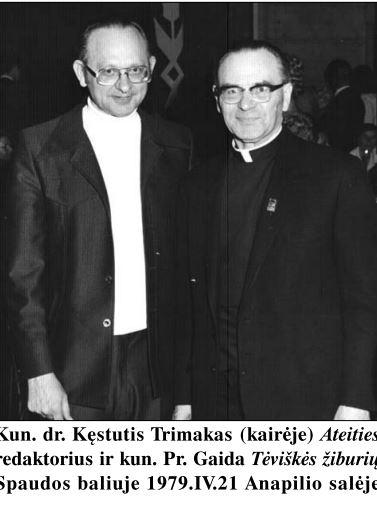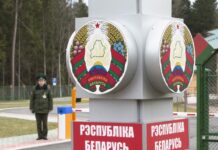
The DP’s who came to Canada in large numbers after WWII brought their political convictions with them. With Lithuania being a predominantly Catholic country, friction had arisen between the Nationalists of the pre-war authoritarian government and the Christian-Democrats, and was renewed among the new immigrants, lasting several decades. It influenced the Community until a new generation came into leadership in the 1980’s. In his letter of November, 1949, accepting the position of editor Dr. Šapoka was not explicit about the political climate that divided the newcomers, and in fact expressed tolerance of all views. Yet his emphasis on Catholic Lithuanian values made the newspaper’s policy very clear:
This newspaper must be published by Catholics [his emphasis] for Lithuanians in the diaspora, to safeguard all Lithuanian traditions (among which religion is obviously paramount), and to safeguard Lithuanian moral values and nurture Lithuanian culture. It must also be able to gratify Lithuanians who are not interested in religion, but who are concerned with every Lithuanian issue. It must, of course, never yield to influences detrimental to Catholics.
As editor of The Lights of Homeland, Šapoka was later described by Cultural Institute researcher Dr. Valdas Selenis as someone who sought common ground to unify the Lithuanian Canadian Community, rather than siding with conflicting groups. Writing in the newspaper, he addressed his friends, said Selenis. Who were they? All his readers were his friends (bičiuliai – a Lithuanian word for close friend), it seems, and this was his goal. He had the foresight to know what was important for the future.
 Also instrumental in the founding and growth of the newspaper was Rev. P. Ažubalis. Never an editor or board member, the pastor of St. John the Baptist parish was a commmunity-builder of great vision, well-known for helping both individuals and organizations, and he was dedicated to the advancement of the newspaper. Not only did he guarantee the $1500 loan required for the newspaper to start printing, he also provided space in the basement of his church rectory for editors and staff, in 1955 building an addition to the rectory which he rented to the newspaper for minimal cost.
Also instrumental in the founding and growth of the newspaper was Rev. P. Ažubalis. Never an editor or board member, the pastor of St. John the Baptist parish was a commmunity-builder of great vision, well-known for helping both individuals and organizations, and he was dedicated to the advancement of the newspaper. Not only did he guarantee the $1500 loan required for the newspaper to start printing, he also provided space in the basement of his church rectory for editors and staff, in 1955 building an addition to the rectory which he rented to the newspaper for minimal cost.
By 1954, the newspaper had developed a growing network of subscribers and correspondents, as well as sufficient finances with income from the Lights Printing Company. Nevertheless the publication subsisted on a shoestring budget: contributors were not paid, and volunteers formed the base that allowed work to continue – then and for many years to come. Eventually staff was paid, but salaries barely reached the Canadian average for those positions, which was true of most ethnic newspapers of the time.
As the weeky publication grew in scope, the increasing workload meant that Šapoka needed an assistant, and Rev. Dr. Pranas Gaidamavicius-Gaida was hired to fill that position. Gaida had studied at Vytautas Magnus University in Kaunas, Lithuania, then received a doctorate in Theology from the University of Freiburg, Germany. He continued his studies in Belgium and worked with Lithuanians in the Liege district. In 1950 he began teaching philosophy at the seminary of Mont-Laurier, Quebec, and was still in Quebec when he was invited to be editorial assistant to Šapoka.
Articles in the fifth and tenth anniversary issues of the Lights of Homeland were generous in their thanks to everyone who had dedicated their time and efforts to the newspaper’s success. Names of contributors from Canada, USA, South America, Brazil, Australia and Europe filled the columns, and sincere gratitude was expressed to all the volunteers who came to help with its distribution on publication day every Tuesday.
In 1954 Rev. Gaida wrote about the purpose of the Lights of Homeland:
The newspaper is not meant to linger on its readers’ bookshelves, but in their hearts and minds. It is not meant to be preserved, but to move and to move others. To be the reader’s daily or weekly bread. It affects its community not by any bibliographic longevity, but by its relevance. It is like a new drop falling daily, weekly and monthly. If it can wear into stone, it can shape a community – one way or another. It informs its readers, inspires joy or sadness, makes them think, and unites them with the worldwide Lithuanian community. Therefore it must be straight and true, for if it is not, it may distort its readers’ thoughts and give rise to discord in the community. …And every issue of The Lights of Homeland has been based on the principles held by the majority of the Lithuanian community – our Christian and patriotic values. These were the reason the newspaper was born, and the purpose which it will continue to defend.
Although the newspaper defined itself as non-political, this meant only that it did not espouse or give voice to any particular party. It did mean that every crumb of information about the Community, the homeland and anything affecting them was important, be it politics, religion, charitable work or culture.
An article by Rev. Dr. Jonas Gutauskas, one of the founding fathers of the publication, reveals the idealism that was to guide it through the decades to come.
Humans are social beings, and can only be useful and use their skills in the context of a society. Just as people are at the service of their community, so are newspapers. No one publishes newspapers for themselves – they are meant for a society, or community. Commercial newspapers, of course, are there to win over a community and even pander to it so as to make a larger profit. Yet our Lithuanian newspaper has travelled a different and quite thorny path. It has been subject to financial difficulty, and its losses often outweigh its profits.
Our newspaper is our society’s nurturer, presenting its readers with religious, national and social ideals, showing them what is true and beautiful and good. It is the teacher of several thousand students. If we put together fifty issues of the newspaper, we would have a huge collection of news and information that tells the story of life today.
It also serves to unify its readers into one family, bringing together the children of our nation and speaking of their activities wherever they may live – in other towns, countries and continents. It tells them, in their own language, what is happening in the world, in their enslaved country, and what is being done to free it. Its mission is to help all, who were forced to leave it, to feel less lonely, to know that they belong. The newspaper calls us all to action, to remind us all that the fight for freedom must continue until independence is achieved.
The Lithuanian press will prevail as long as the idealism motivating its members remains alive. Their numbers may decline. Its survival is the responsibility of every Lithuanian.
1959-12-10-TEVISKES-ZIBURIAI-3





























